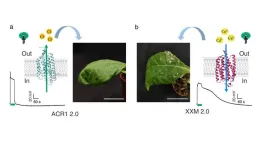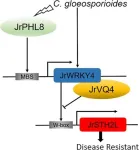(Press-News.org) If you’ve seen those viral social media videos of dogs using soundboard buttons to “talk,” you’re not alone. These buttons have taken the pet world by storm, leading to impressive and sometimes seemingly miraculous feats shared across platforms like TikTok and Instagram. But are these dogs truly communicating, or are they just responding to cues from their owners?
Now, a new study published in PLOS ONE – by researchers from the University of California San Diego and other institutions – reveals that dogs trained with soundboard buttons can indeed comprehend specific words, producing contextually appropriate responses. Led by Federico Rossano, associate professor in the Department of Cognitive Science at UC San Diego and head of the Comparative Cognition Lab, this is the first empirical study emerging from the world’s largest longitudinal project on button-trained pets.
Rossano, who is also featured in the popular new Netflix documentary “Inside the Mind of a Dog,” emphasizes that this research is just one step in his lab’s ongoing investigation of interspecies communication.
Key findings: The study shows that dogs trained to use soundboards responded appropriately to words like “play” and “outside,” regardless of whether the words were spoken by their owners or triggered by pressing a button, as well as whether the buttons were pressed by the owner or an unrelated person. This suggests that dogs are not merely “reading” their owners’ body language or presence but are indeed processing the words.
“This study addresses public skepticism about whether dogs truly understand what the buttons mean,” said Rossano. “Our findings are important because they show that words matter to dogs, and that they respond to the words themselves, not just to associated cues.”
The research involved two complementary experiments. The first was conducted in person, with researchers visiting 30 dogs’ homes across the country to test their responses to soundboard buttons. The second experiment utilized citizen science, where 29 dog owners conducted the trials themselves at home under remote guidance.
The study’s methodology was rigorously pre-registered, ensuring transparency and replicability. This pre-registration, which is publicly available online, outlines the study’s hypotheses, data collection methods, variables, and analysis plans before any data was collected. This process, Rossano explained, enhances accountability, reduces the risk of cherry-picking results, and aligns with a growing movement in cognitive science and psychology to increase scientific rigor and reduce the likelihood of bias or fraud.
Rossano added, “We’re just scratching the surface in this study. Future studies explore how dogs actively use these buttons, including the meaning and systematicity behind sequences of button presses. Our research underscores the importance of studying animals in their home environment, providing a more ecologically valid understanding of their abilities.”
This study is part of a larger, ongoing research project involving thousands of participants worldwide. Upcoming research will delve deeper into how dogs spontaneously use soundboard buttons, further illuminating the complexities of dog cognition and communication.
The paper’s first author is Amalia Bastos, a former postdoc at UC San Diego now a postdoc at Johns Hopkins University. The study was also conducted in collaboration with researchers from UC Davis, University of St. Andrews, Universitat de València, and the University of Veterinary Medicine Vienna. The study data was collected in 2022 during the Omicron surge of the COVID-19 pandemic, with participants generously opening their homes to researchers, highlighting the growing public interest and engagement in citizen science.
This research was supported in part by a UC San Diego Academic Senate Research Grant (RG103503).
END
Dogs understand words from soundboard buttons, study reveals
The study is the first empirical paper to emerge from the world’s largest longitudinal project on button-trained pets led by UC San Diego
2024-08-28
ELSE PRESS RELEASES FROM THIS DATE:
New pancreatic cancer treatment proves effective in shrinking, clearing tumors
2024-08-28
Researchers at the University of Massachusetts Amherst and UMass Chan Medical School have demonstrated in mice a new method to combat pancreatic cancer. The study, published in Science Translational Medicine, outlines the synergistic effects of a novel nanoparticle drug-delivery system to activate an immune pathway in combination with tumor-targeting agents.
Pancreatic ductal adenocarcinoma (PDAC) is the most common form of pancreatic cancer. With a dismal,13% five-year survival rate, it is the third leading cause of cancer deaths.
One major ...
Study reveals isolation, endogamy and pathogens in early medieval Spanish community
2024-08-28
An archaeogenetic study sheds new light on the isolated medieval community Las Gobas in northern Spain. Besides isolation and endogamy, the researchers have also identified the variola virus which can offer a new explanation on how smallpox entered Iberia.
Researchers from Sweden and Spain have conducted a comprehensive archaeogenetic study on a community that lived on the border between the northern Christian kingdoms and Al-Andalus during the early Medieval period. This dynamic era, especially ...
Chromosome copying errors pinpointed in embryo development
2024-08-28
A new discovery by researchers at the RIKEN Center for Biosystems Dynamics (BDR) in Japan upends decades of assumptions regarding DNA replication. Led by Ichiro Hiratani and colleagues, the experiments published August 28 in Nature show that DNA replication in early embryos is different from what past research has taught, and includes a period of instability that is prone to chromosomal copying errors. As failed pregnancies and developmental disorders are often related to chromosomal abnormalities the findings could impact the field of reproductive medicine, perhaps leading to improved methods of in vitro fertilization (IVF).
During embryogenesis, ...
A cellular community in the brain drives Alzheimer’s disease
2024-08-28
NEW YORK, NY (Aug. 28, 2024)--An analysis of more than 1.6 million brain cells from older adults has captured the cellular changes that occur in the early stages of Alzheimer’s disease, potentially revealing new routes for preventing the most common cause of dementia in older individuals.
The study also identified a second community of cells that drives the older brain down a different path that does not lead to Alzheimer’s disease.
“Our study highlights that Alzheimer’s is a disease of many cells and their interactions, not just a single type of dysfunctional ...
Plant signaling pathways decoded
2024-08-28
When it comes to survival, plants have a huge disadvantage compared to many other living organisms: they cannot simply change their location if predators or pathogens attack them or the environmental conditions change to their disadvantage.
For this reason, plants have developed different strategies with which they react to such attacks. Such reactions are usually triggered by certain signals from the environment. As has long been known, the intracellular calcium concentration plays an important role in the processing of these signals.
However, in addition to changes in the cytoplasmic calcium level, changes in the cell's ...
Fighting fungal foes: Walnut's genetic armor against anthracnose revealed
2024-08-28
A pivotal study has pinpointed a gene module crucial for enhancing walnut trees' resistance to anthracnose, a widespread fungal disease threatening the walnut industry. The research reveals how the JrPHL8-JrWRKY4-JrSTH2L module regulates disease defense, opening up new opportunities for breeding resistant walnut varieties and promoting sustainable cultivation practices.
Anthracnose, caused by Colletotrichum gloeosporioides, poses a significant threat to walnut production, causing severe losses ...
Rice engineers develop AI system for real-time sensing of flooded roads
2024-08-28
Roadway-related incidents are a leading cause of flood fatalities nationwide, but limited flood-reporting tools make it difficult to evaluate road conditions in real time.
Existing tools — traffic cameras, water-level sensors and even social media data — can provide observations of flooding, but they are often not primarily designed for sensing flood conditions on roads and do not work in conjunction. A network of sensors could improve situational flood level awareness; however, they are expensive to operate at scale.
Engineers at Rice University have developed a possible solution to this problem: an automated data ...
Dr. David A. Schwartz receives 39th annual Alton Ochsner Award
2024-08-28
NEW ORLEANS – Ochsner Health has announced David A. Schwartz, MD, as the 2024 winner of the Alton Ochsner Award Relating Smoking and Disease. Dr. Schwartz is a Distinguished Professor of Medicine and Immunology and director of the Program to Advance Physician Scientists and Translational Research at University of Colorado’s Anschutz School of Medicine.
Dr. Schwartz won the 39th annual Alton Ochsner Award for his research on how genetic and environmental factors, including smoking, contribute to idiopathic pulmonary fibrosis (IPF). He found that ...
New data: Solar at K-12 schools quadrupled nationwide during the last ten years
2024-08-28
Charlottesville, VA — Schools across the country are rapidly switching to solar power to meet their energy needs while gaining significant cost-savings, boosting climate resilience, and supporting workforce development, according to a new report from clean energy nonprofit Generation180. Since the start of 2014, the amount of solar capacity installed at K-12 schools has more than quadrupled nationwide.
According to Brighter Future: A Study of Solar on K-12 Schools, 5th edition, over 6.2 million U.S. K-12 students– or more than one in nine students – now attend a school that utilizes solar power. In 2022-2023, over 800 schools added solar arrays, which is enough ...
Thermochromic material could make indoor temperature control more energy-efficient
2024-08-28
HOUSTON – (Aug. 28, 2024) – Rice University researchers have developed a smart material that adjusts its transparency with changes in temperature, outperforming similar materials in terms of durability, transparency and responsiveness. The new polymer blend could significantly enhance energy efficiency for indoor space cooling, according to a new study published in Joule.
Cooling off can be a matter of life or death, but air conditioning ⎯ when and if available ⎯ already accounts for 7% of the world’s energy use and 3% of carbon emissions. With temperatures hitting record ...
LAST 30 PRESS RELEASES:
Children with poor oral health more often develop cardiovascular disease as adults
GLP-1 drugs associated with reduced need for emergency care for migraine
New knowledge on heritability paves the way for better treatment of people with chronic inflammatory bowel disease
Under the Lens: Microbiologists Nicola Holden and Gil Domingue weigh in on the raw milk debate
Science reveals why you can’t resist a snack – even when you’re full
Kidney cancer study finds belzutifan plus pembrolizumab post-surgery helps patients at high risk for relapse stay cancer-free longer
Alkali cation effects in electrochemical carbon dioxide reduction
Test platforms for charging wireless cars now fit on a bench
$3 million NIH grant funds national study of Medicare Advantage’s benefit expansion into social supports
Amplified Sciences achieves CAP accreditation for cutting-edge diagnostic lab
Fred Hutch announces 12 recipients of the annual Harold M. Weintraub Graduate Student Award
Native forest litter helps rebuild soil life in post-mining landscapes
Mountain soils in arid regions may emit more greenhouse gas as climate shifts, new study finds
Pairing biochar with other soil amendments could unlock stronger gains in soil health
Why do we get a skip in our step when we’re happy? Thank dopamine
UC Irvine scientists uncover cellular mechanism behind muscle repair
Platform to map living brain noninvasively takes next big step
Stress-testing the Cascadia Subduction Zone reveals variability that could impact how earthquakes spread
We may be underestimating the true carbon cost of northern wildfires
Blood test predicts which bladder cancer patients may safely skip surgery
Kennesaw State's Vijay Anand honored as National Academy of Inventors Senior Member
Recovery from whaling reveals the role of age in Humpback reproduction
Can the canny tick help prevent disease like MS and cancer?
Newcomer children show lower rates of emergency department use for non‑urgent conditions, study finds
Cognitive and neuropsychiatric function in former American football players
From trash to climate tech: rubber gloves find new life as carbon capturers materials
A step towards needed treatments for hantaviruses in new molecular map
Boys are more motivated, while girls are more compassionate?
Study identifies opposing roles for IL6 and IL6R in long-term mortality
AI accurately spots medical disorder from privacy-conscious hand images
[Press-News.org] Dogs understand words from soundboard buttons, study revealsThe study is the first empirical paper to emerge from the world’s largest longitudinal project on button-trained pets led by UC San Diego










